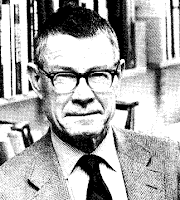
My sophomore year in college I took Econ 1030 from Schelling. I believe the course was entitled something like “Conflict and Strategy.” I still have vivid memories of the course. A crew-cut Schelling paced back and forth across the stage (never with any notes, if I remember correctly), spewing forth story after story that illuminated the application of simple game theory concepts in every day life.
For me, this first introduction to game theory was inspirational. For someone who thinks strategically, or would like to think strategically, the basic tools of game theory are essential. The beauty of Schelling’s class was how easy the math was and how readily it applied to real world settings. The topics of the course were basic: the Prisoner’s Dilemma in lecture 1, Schelling’s own “tipping point” model in lectures 2&3, the tragedy of the commons and public goods games after that, then commitment devices, credible and non-credible threats, and the strategy and tactics of controlling one’s own behavior.
(For those who are unaware, Schelling coined the term “Tipping Point” thirty years before Gladwell made it popular.)
To my mind, Schelling represents the very best of game theory. He was a pioneer in the field, a man of ideas. Unfortunately for game theory, the simple ideas that are so alluring were quickly mined. What followed was less interesting. Modern game theory has become extremely mathematical, notation heavy, and removed from everyday life. Many of my colleagues would not agree with me, but I think game theory has failed to deliver on its enormous initial promise. I’m not the only one who feels this way. I was recently speaking with a prominent game theorist. He told me that if he knew what he knew and he were just getting started in the profession today, no way would he be a game theorist.
Schelling was an early inspiration to me. His course and writings were one of the big influences pushing me towards economics. My approach to economics shares much with his approach. I was saying this to one of my colleagues last year, who happened to run into Schelling and told Schelling he should count me as one of his students. Schelling was unmoved.
For much more on Schelling, read this post by Tyler Cowen.
(HT Marginal Revolution)
No comments:
Post a Comment